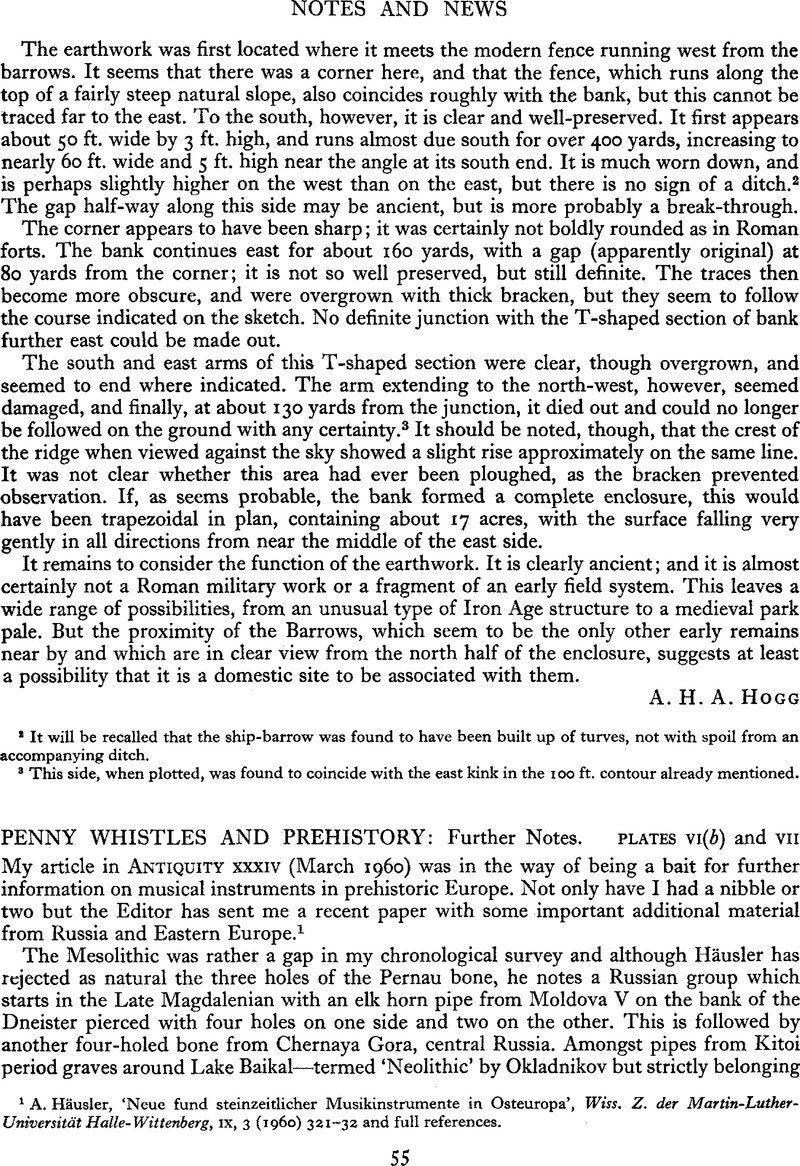Published online by Cambridge University Press: 02 January 2015

1 A. Häusler, ‘Neue fund steinzeitlicher Musikinstrumente in Osteuropa’, Wiss. Z. der Martin-Lutker-Universität Halle-Wittenberg, IX, 3 (1960) 321-32 and full references.
2 A. P. Okladnikov, MIA, 18 (1950), 396 ff.
3 A most useful summary of this material is H. N. Michael, ‘The Neolithic Age in Eastern Siberia’, Trans. American Phil. Soc., N.S. 48, Pt. 11 (1958); here 69-70, fig. 66 and references. My thanks are due to Professor Stuart Piggott for bringing this publication to my notice.
4 O. Seewald, Beiträge zur Kenntnis der steinzeitlichen Musikinstrumente Europas (1934), 36 f.
5 Häusler, op. cit., 323 and Taf. 111, 4. F. Behn, Musikleben im Alertum und frühen Mittelalter (1954). 110 f. notes the importance of the pan-pipe to the development of music and at Taf. 193 illustrates the better known wooden example from Alesia.
6 Michael, loc. cit.
7 A handy English reference is M. W. Prausnitz, ‘Ay and the chronology of Troy’, 11th. Ann. Report Inst. Arch. (1955), 21 f. and fig. 2.
8 Glyn Daniel, Prehistoric Chamber Tombs of France (1960), 136 f. and pl. XXIII. This may be added to the antler pipe from near Poitiers which I noted in my article. In contrast an unpierced decorated bone was found in the Grotte de la Treille, Narbonne, with faiënce beads; Daniel, op. cit., 144.
9 WAM, LV (1954), 323, fig. 3; Mrs Jenkins had also written a handy introduction to primitive musical instruments issued by the Horniman Museum; Musical Instruments (1958). A continental Bronze Age new-comer (of pottery!) is published by O. Seewald, ‘Eine bronzezeitliche Gefässflöte von Vörösmart, Kom. Baranya, Ungarn’, Acta Praehistorica, 11: Centro Argentino de Estudios Prehistorios (1958), 111–21. Unfortunately at the time of writing I have been unable to follow up this reference kindly supplied me by Dr K. Willvonseder of Salzburg.
10 J. W. Brailsford, British Museum Guide to the Antiquities of Roman Britain (1951), 78, fig. 40, 4.
11 R. W. Hutchinson, ANTIQUITY (1960), 140–41. Mr MacGillivray and I illustrated this difference in a broadcast in The Archaeologist series, ‘Prehistoric Musical Instruments and their Music’, B.B.C. Network Three, 12 April, 1960.
12 D. von Bartha, ‘Die avarische Doppelschalmei von Jánoshida’, Archaeologia Hungarica, 14 (1934); Mr Lindsay Langwill of the Galpin Society reminded me of this reference. See also A. Baines, Bagpipes; Pitt Rivers Museum Occasional Papers on Technology, 9 (1960), 51–3, 58 and fig. 24.